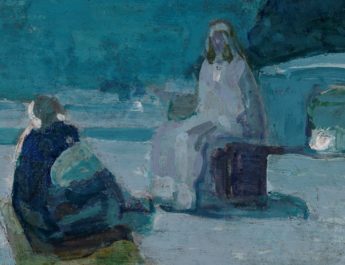Psalm 145:1-5, 17-21
Ordinary C50
Praise.A Of David.B
1 I will extolC you, my GodD and King,E
A “praise” = tehillah. From halal (to praise, be boastful). This is praise or a song of praise. It is to offer God a hymn, to boast in God. This shares a root with “hallelujah.”
B “David” = David. From the same as dod (beloved, love, uncle); the root may mean to boil, which is used figuratively to describe love. So, this implies someone you love such as a friend, a lover, or a close family member like an uncle. David’s name likely means something like “beloved one.”
C “extol” = rum. This is to rise or raise, to be high literally or figuratively. So it can also mean to exalt or extol.
D “God” = Eloah. From el (God or god). This is God or a god.
E “King” = melek. From malak (to be or become king or queen, to rise to the throne, to be crowned; by implication, to take counsel). This is king or royal.
and blessF your nameG foreverH and ever.I
F “bless” = barak. This is to kneel, to bless. It is blessing God as part of worship and adoration or blessing humans to help them. It can be used as a euphemism to say curse God.
G “name” = shem. May be from sum (to put, place, set). This is name, fame, renown. A name was thought to indicate something essential about a person – something about their individuality. So, this word can also mean honor, authority, or character.
H “forever” = olam. This is a long scope of time whether in the past (antiquity, ancient time) or in the future (eternal, everlasting).
I “ever” = ad. From adah (to advance or continue; to take away or remove; adorning oneself with ornaments). This is old, perpetuity, eternity. It is a duration going back or forward.
2 EveryJ dayK I will bless you
and praiseL your name forever and ever.
J “every” = kol. From kalal (to complete). This is all or every.
K “day” = yom. Root may mean being hot. This is the day in a literal or figurative sense. It can also mean birth, age, daylight, continually or other references to time.
L “praise” = halal. Related to “praise” in superscript. See note A above.
3 GreatM is the LordN and greatlyO to be praised;
his greatnessP is unsearchable.Q
M “great” = gadol. From gadal (to grow up, become great, become wealthy – to advance. The root meaning may be to twist in the sense of the process of growing). This is great, high, bigger, noble, old, marvelous. It can also refer to someone who is powerful or distinguished.
N “Lord” = YHVH. From havah (to be, become) or hayah (to come to pass, become, be). This is the name of the God of Israel, the self-existent and eternal one, the tetragrammaton. This pronunciation has been lost to time so “Lord” is generally used in its place.
O “greatly” = meod. Perhaps from the same as uwd (firebrand, a poker). This is very, greatly, exceedingly. It can also mean vehemence, force, abundance.
P “greatness” = gedullah. Related to “great” in v3. 12x in OT. From gadal (see note M above). This is greatness, dignity, high honor, or mighty acts.
Q “unsearchable” = ayin + cheqer. Cheqer is 12x in OT. From chaqar (properly, to penetrate; to thoroughly investigate, examine, ponder, or seek out). This is depth, inquiry – something to be examined or enumerated.
4 One generationR shall extolS your worksT to anotherU
and shall declareV your mighty acts.W
R “generation” = dor. From dur (to move in a circle, which implies living somewhere or remaining there; it can also be the sense of piling or heaping up). This is a revolution of time, which is to say, an age or generation. It can also be a dwelling or one’s posterity.
S “extol” = shabach. 11x in OT. This is to glory, praise, triumph. It can also mean still or soothe. Properly, it is speaking to loudly or to calm through speech.
T “works” = maaseh. From asah (to do, make, accomplish, become). This is a work – any action whether positive or negative. It can also be a transaction, construction, activity, property, or something that is produced.
U “another” = dor. Same as “generation” in v4. See note R above.
V “declare” = nagad. This is to declare, make conspicuous, stand in front, manifest, predict, explain.
W “mighty acts” = geburah. From gabar (to be strong or mighty; to prevail or be insolent). This is force in a literal or figurative sense. So, it could be strength, power, courage, triumph, victory, or mastery.
5 They will recount the gloriousX splendorY of your majesty,Z
X “glorious” = kabod. From kabad (to be heavy, weighty, burdensome). This is weighty. Figuratively, glorious, abundant, riches, honor, splendor – a reference to one’s reputation or character. This word is often used to describe God and God’s presence.
Y “splendor” = hadar. From hadar (to honor or adorn; majestic, respected, glorious; to favor or honor; to be proud). This is ornament, splendor, beauty, dignity, majesty, magnificence, and glory.
Z “majesty” = hod. This is grandeur, beauty, glory, honor, or authority. It emphasizes a form or appearance with gravitas.
and on your wondrousAA worksBB I will meditate.CC
AA “wondrous” = pala. From pele (wonder, miracle, wonderful, marvelous thing). This is to be extraordinary, to arise, to be great or accomplish.
BB “works” = dabar. From dabar (to speak, declare, discuss). This is speech, a word, a matter, an affair, charge, command, message, promise, purpose, report, request. It is a word, which implies things that are spoken of in a wide sense.
CC “meditate” = siach. From siach (musing, meditation, communication, babbling, prayer, contemplation). This is to muse, meditate, complain, sing, sigh, speak, or utter.
17 The Lord is justDD in allEE his waysFF
and kindGG in all his doings.HH
DD “just” = tsaddiq. From the same as tsedeq (rightness, righteousness, just cause, vindication; that which is right in a natural, moral, or legal sense; abstractly equity; figuratively prosperity). This is just, innocent, righteous, righteous one, or lawful.
EE “all” = kol. Same as “every” in v2. See note J above.
FF “ways” = derek. From darak (to tread, march, to walk. Can also mean affixing a string to a box since one needs to step on it to bend it in the process; so also an archer). This is a road as a thing that is walked on. Can be used figuratively for the path that one’s life takes or how one chooses to live one’s life.
GG “kind” = chasid. From chasad (being good, kind, merciful; may mean bowing one’s neck as is done in the presence of an equal for courtesy’s sake; so, if one in a superior position is treating you like an equal, that is what is captured here). This is faithful, kind, pious, merciful, or gracious. It can also refer to godly or pious people. This is where Chasidic Jews take their name from.
HH “doings” = maaseh. Same as “works” in v4. See note T above.
18 The Lord is nearII to all who call onJJ him,
to all who call on him in truth.KK
II “near” = qarob. From qarab (to come near, offer, make ready). This is near whether nearby, related, near in time, or allied.
JJ “call on” = qara. This is to call or call out – to call someone by name. Also used more broadly for calling forth.
KK “truth” = emet. From aman (to believe, endure, fulfill, confirm, support, be faithful, put one’s trust in, be steadfast. Figuratively, this is to be firm, steadfast, or faithful, trusting, believing, being permanent, morally solid). This is firmness or stability. Figuratively, it is faithfulness, truth, or trustworthiness. This is the same root that “amen” comes from.
19 He fulfillsLL the desireMM of all who fearNN him;
he also hearsOO their cryPP and savesQQ them.
LL “fulfills” = asah. Related to “works” in v4. See note T above.
MM “desire” = ratson. From ratsah (to be pleased with, delight, take pleasure in, or accept with favor; to approve or consent regarding something; can be used specifically of satisfying debts or being pardoned). This is delight shown in favor, good will, something that is accepted or acceptable.
NN “fear” = yare. From yare (to fear, be afraid, dreadful; also fearful reverence – to fear in a moral sense is to say to revere, respect). This is fearful or morally reverent.
OO “hears” = shama. This is to hear, call, consent, or consider. It implies listening intelligently, giving attention, and, because of these two factors, obedience and action are often implied.
PP “cry” = shavah. 11x in OT. From shava (crying or shouting aloud; seeking freedom from some kind of trouble). This is cry, cry for help.
QQ “saves” = yasha. To deliver, defend, help, preserve, rescue, be safe. Properly, to be open, wide or free, which implies being safe. Used causatively, it means to free.
20 The Lord watches overRR all who loveSS him,
but all the wickedTT he will destroy.UU
RR “watches over” = shamar. This is to keep, watch, or preserve. It means to guard something or to protect it as a thorny hedge protects something.
SS “love” = aheb. This is to love, beloved, friend. It is to have affection for sexually or otherwise.
TT “wicked” = rasha. This is morally wrong so it refers to someone who is actively bad as wicked, criminal, an evil person, offender, condemned, or ungodly.
UU “destroy” = shamad. This is to demolish, destroy, perish, overthrow, pluck down.
21 My mouthVV will speakWW the praise of the Lord,
and all fleshXX will bless his holyYY name forever and ever.
VV “mouth” = peh. This is mouth in a literal or figurative sense. So, more literally, it can be beak or jaws. More figuratively, it refers to speech, commands, or promises.
WW “speak” = dabar. Related to “works” in v5. See note BB above.
XX “flesh” = basar. From basar (being a messenger, publish, carry preach; properly, this is being fresh, rosy or cheerful as one bearing news). This is flesh, the body, fat, skin, self, nakedness, humankind, or kin. It can also refer to private parts.
YY “holy” = qodesh. This is set apart and so sacred. God is different from us and so God is holy/set apart. Things we dedicate to God’s service are set apart for God and so they, too, are holy, etc.
Image credit: “Sunset over the Lake” by Brian Entz, 2022.




